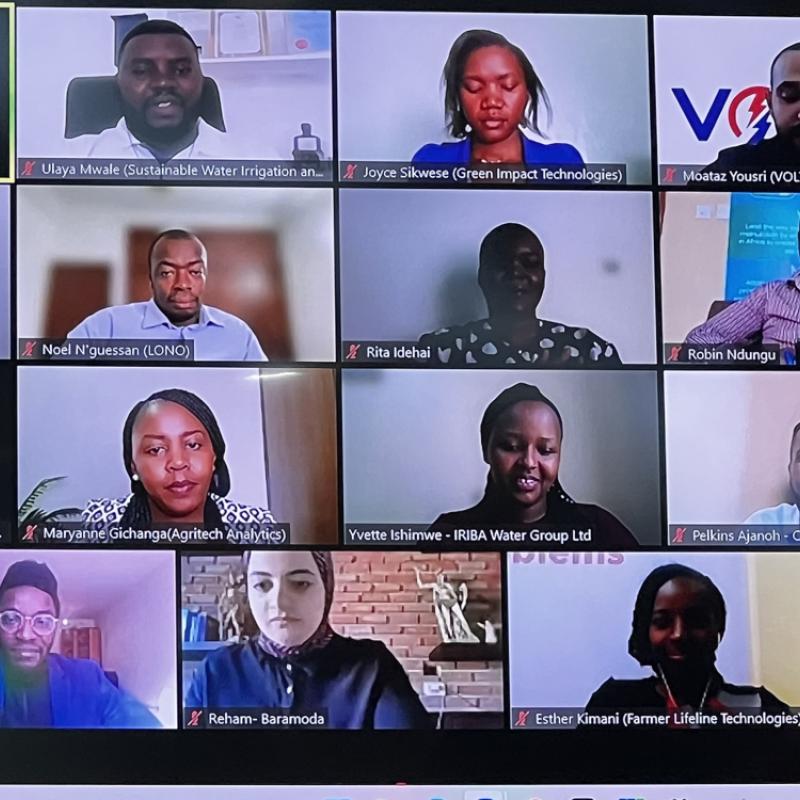
AAAP in the Media
Displaying 1 - 12 of 49
Staple Crops Processing Zone (SCPZ): funding proposal to the Green Climate Fund
The target countries of Democratic Republic of the Congo, Ethiopia, Togo and Zambia are regions experiencing high deforestation, poor agriculture yield and increasing poverty exacerbated by climate change. Across all four countries, climate variability and change has become a major threat to sustainable development.
As part of efforts to address these challenges, the four countries are implementing national projects to establish Staple Crops Processing Zones: initiatives designed to concentrate agro-processing activities within areas of high agricultural potential to boost productivity and integrate production, processing and marketing of selected commodities. These initiatives are purposely built shared facilities, to enable agricultural producers, processors, aggregators and distributors to operate in the same vicinity to reduce transaction costs and share business development services for increased productivity and competitiveness.
Developing adequate infrastructure (energy, water, roads, ICT) in rural areas of high agricultural potential should attract investments from private agro-industrialists/entrepreneurs to contribute to the economic and social development of rural areas.
The Staple Crops Processing Zone (SCPZ) development program aims to transform agriculture production in regions experiencing high deforestation, poor agriculture yield and increasing poverty exacerbated by climate change, including the target countries of Democratic Republic of the Congo, Ethiopia, Togo and Zambia.
The specific objectives of SCPZ are: (i) improving access to seed capital through grants and matching grants; (ii) supporting productivity enhancement through introduction of new technologies and agricultural inputs; (iii) improving access to infrastructure by supporting investment; (iv) improving the capacity of producer cooperative through training and TA, especially for targeted women and youth groups; (v) facilitating market linkages throughout-growers’ schemes; and (vi) facilitating on-farm value addition by targeting limited value chains and linking farmers to the supply chain.
GCF financing is sought to strengthen one of the project components of SCPZ in Democratic Republic of the Congo, Ethiopia, Togo and Zambia.
- Through the technical assistance program, AAAPwill accelerate the mobilization of adaptation finance.
- Increased carbon sinks in soil and above-ground biomass
- Reduced carbon dioxide/other greenhouse gas emissions from farms due to efficient energy use
- Increased renewable energy production from biomass, either as a substitute for fossil fuels or as a replacement for burning of fuel wood or crop residues
- Fewer incidents of bare soils, reduced soil erosion and increased water percolation.
- Reduced emissions through low-emission energy access and power generation
- Reduced emissions due to improved waste management, including by recycling waste and use of waste in biogas systems
- Reduction of emissions from land use and deforestation, and enhancement of forest carbon stocks.
-
Increased resilience, including to extreme events such as droughts and floods, and enhanced livelihood of about 55% of highly vulnerable people and communities
-
Increased access to better health and wellbeing, and food and water security to over 100,000 beneficiaries, in addition to provision of alternative sources of energy
-
Increased resilience of ecosystems and ecosystem services in forests and savannas
USD 427 million:
- Funding proposal to GCF seeking USD 174.02 million (USD 130.02 million grant and USD 44 million loan)
- AfDB providing USD 111.2 million (USD 85.2 million loan and USD 26 million grant)
- Co-financiers:
European Union, USD 10.4 million (grant)
BOAD, USD 17.6 million (loan)
Korea Exim Bank, USD 50 million (loan)
Korea Fund, USD 5 million (grant)
Islamic Development Bank, USD 31 million (loan)
Governments of target countries, USD 28 million (counterpart financing)
Global Leaders Rally Support and Finance for the Africa Adaptation Acceleration Program to Tackle Climate Change in Africa
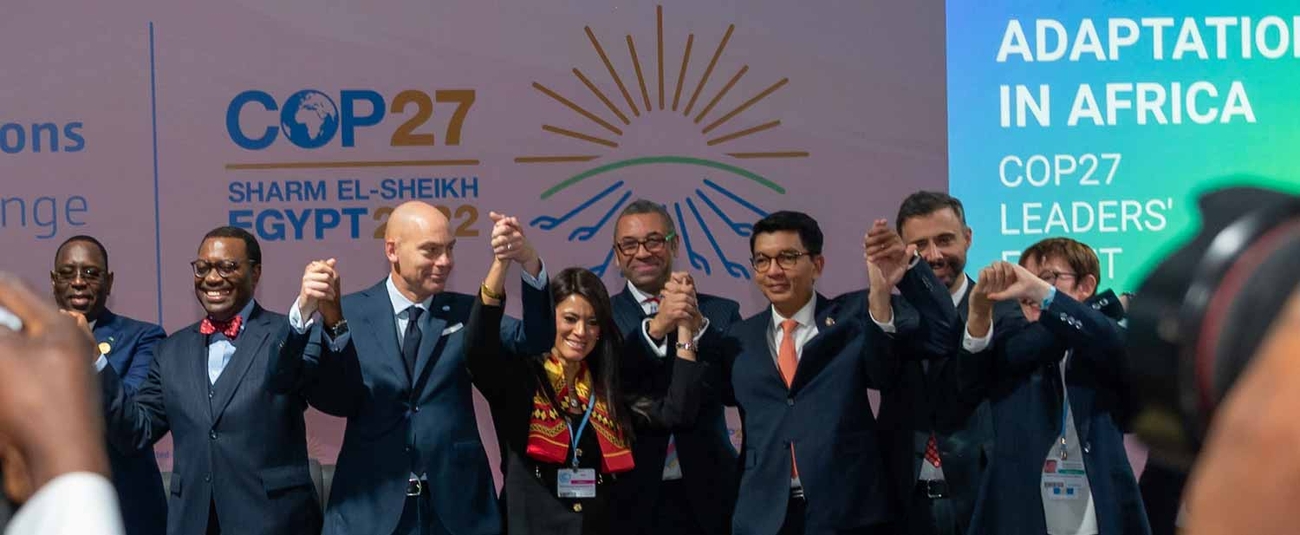
Global leaders on Tuesday rallied around climate adaptation for Africa. They attended the Africa Adaptation Leaders’ Event, convened by African Union Chair President Macky Sall of Senegal, Global Center on Adaptation CEO Patrick Verkooijen, and African Development Bank Group President Akinwumi Adesina.
The event took place at the global climate summit (COP27) in Sharm El-Sheikh, Egypt. It underscored the critical need for climate adaptation in Africa and responded to the call for the capitalization of the Africa Adaptation Acceleration Program (AAAP).
“This is a pivotal step in the fight against climate change,” African Union Chair President Macky Sall said. “The commitments made by Africa’s partners will give the Africa Adaptation Acceleration Program the boost that it needs to transform the development trajectory of the world’s most climate exposed continent. I am confident in the ability of the AAAP to deliver results for Africa.”
The Africa Adaptation Acceleration Program is an Africa-owned and Africa-led initiative developed by the Global Center on Adaptation (GCA) and the African Development Bank (AfDB) in close collaboration with the African Union. It serves as the implementation of the Africa Adaptation Initiative (AAI) to mobilize $25 billion to implement, scale and accelerate climate adaptation across the Africa. Since 2021, AAAP has mainstreamed climate adaptation in over$3.5 billion of investments in 19 countries.
United Nations Secretary-General António Guterres said: “I want to express my total solidarity for the Africa Adaptation Acceleration Program […] I urge the international community to support Africa to mobilize the technical & financial resources for scaling up transformative adaptation.”
“With this innovative program, Africa has developed a plan to grow, create jobs and opportunities for people, and to be resilient against the climate crisis,” said President Akufo-Addo of Ghana. “AAAP’s singular focus on the issue of climate adaptation will also contribute to greater stability and progress in Africa and around the world. AAAP is aligned with Ghana’s plans to address climate change as it chairs the Climate Vulnerability Forum (CVF) to lead efforts from the world’s most climate vulnerable countries to spur and mobilize investment through the Climate Prosperity Plans."
James Cleverly, Secretary of State for Foreign, Commonwealth and Development Affairs of the United Kingdom announced that the UK will provide £200 million to the African Development Bank’s Climate Action Window. This is in addition to the £20 million announced at COP26 in Glasgow to the AAAP Upstream Financing Facility.
Cleverly noted: “Climate change is having a devastating impact on countries in Sub-Saharan Africa facing drought and extreme weather patterns, which have historically received a tiny proportion of climate finance. This new mechanism […] will see vital funds delivered to those most affected by the impacts of climate change, much more quickly.”
Prime Minister Mark Rutte of the Netherlands followed through on the commitment made at the Africa Adaptation Summit held at the Global Center on Adaptation in September to confirm that the Netherlands will contribute EUR110 million to the AAAP, with EUR10 million in support for the Upstream Financing Facility hosted by GCA and EUR 100 million for the Climate Action Window of the African Development Fund at the African Development Bank as part of the Netherlands’ commitment to dedicate half of its climate funding, fully grant based, to climate adaptation, with a focus on Africa.
Norwegian Prime Minister Jonas Gahr Støre echoed African leaders’ calls for countries to rapidly scale up finance for climate adaptation, stating: “The climate crisis is here and now. Years of progress are at risk.”
“The AAAP Upstream Financing Facility is the delivery mechanism of adaptation and will use millions to leverage the billions that is required for adaptation,” he continued. “AAAP projects will generate effective climate adaptation outcomes. Adaptation is a growth agenda. A jobs agenda. And a prosperity agenda. On behalf of Norway, I am looking forward to continuing this partnership, investing in it, and supporting it with the Global Center on Adaptation.”
International Monetary Fund Managing Director Kristalina Georgieva emphasized the need to accelerate adaptation in Africa, stating: “It is paramount to support Africa’s adaptation because Africa will not reach its tremendous potential without it. AAAP complements the IMF’s Resilience and Sustainability Trust, which helps countries address external shocks such as climate change and ensure sustainable growth that can give Africa a chance to leapfrog outdated development models.”
African Development Bank Group President Dr. Akinwumi Adesina said: “Africa is suffering from the devastating effects of climate change. Our continent is being short changed by climate finance. The contributions towards the Africa Adaptation Acceleration Program’s Upstream Financing Facility and the Climate Action Window – which the African Development Bank manages – will help capitalize the program. With increased capital, we can better deliver the investment needed to bridge the adaptation finance gap. We want to ensure that the most vulnerable communities can benefit from a sustainable and prosperous future.”
Endorsing the outcomes of the high-level meeting, Patrick Verkooijen, CEO of the Global Center on Adaptation, closed with a statement emphasizing the AAAP’s impact to date, noting that “there is no pause button on the climate crisis. Africa must adapt to the threat of climate change, and it must adapt now.”
“Through the AAAP,” he continued, “Africa has charted its path towards a climate-resilient future for its youth, its economic growth, and for its prosperity.”
About the Global Center on Adaptation
The Global Center on Adaptation (GCA) is an international organization which works as a solutions broker to accelerate action and support for adaptation solutions, from the international to the local, in partnership with the public and private sector, to ensure we learn from each other and work together for a climate-resilient future. Founded in 2018, GCA is hosted by the Netherlands, working from its headquarters in Rotterdam with a knowledge and research hub based in Groningen. GCA has a worldwide network of regional offices in Abidjan, Côte d’Ivoire, Dhaka, Bangladesh and Beijing, China. Through this evolving network of offices and global and regional GCA teams, the organization engages in high-level policy activities, new research contributions, communications, and technical assistance to governments and the private sector.
About the African Development Bank
The African Development Bank Group is Africa’s premier development organization. Its overarching objective is to spur sustainable economic development and social progress in its regional member countries, thus contributing to poverty reduction across the continent.
The Bank Group achieves this objective by mobilizing and allocating resources for investment in African countries and providing policy advice and technical assistance to support development efforts.
In 2015, all multilateral development institutions agreed on the same set of objectives, the United Nations Sustainable Development Goals.
Learn more: https://www.afdb.org/
About the Africa Adaptation Acceleration Program
The Africa Adaptation Acceleration Program (AAAP) is a joint initiative of the African Development Bank and the Global Center on Adaptation (GCA). It aims to mobilize $25 billion, over five years, to accelerate and scale climate adaptation action across the continent. This ambition is delivered through the AAAP Upstream Financing Facility managed by the Global Center on Adaptation and the African Development Bank’s climate action window in the ADF replenishment. AAAP works across four pillars to achieve transformational results: Climate-Smart Digital Technologies for Agriculture and Food Security; African Infrastructure Resilience Accelerator; Youth Empowerment for Entrepreneurship and Job Creation in Climate Adaptation and Resilience and Innovative Financial Initiatives for Africa. AAAP has already guided over $3.5 billion of upstream investments in 19 countries with every dollar spent influencing $100 downstream.
COP27 - COP27 Leaders' Event, Accelerating Adaptation in Africa (DAY 2)
State and Trends on Adaptation Report 2021: Africa
Adaption is crucial for the continent that is the most vulnerable to climate change, but adapting successfully will bring enormous benefits.
Climate risk regulation in Africa’s financial sector and related private sector initiatives
Extreme weather phenomena such as rising temperatures and the increasing frequency of droughts and floods are affecting lives and livelihoods in Africa. According to the Global Climate Risk Index 2021,1 five African countries ranked among the 10 countries most affected by extreme weather in 2019: Mozambique (first), Zimbabwe (second), Malawi (fifth), South Sudan (eighth), and Niger (ninth).
State and Trends in Adaptation Report 2022
A year on from State and Trends in Adaptation 2021 (STA21) which set out our blueprint for adaptation action, the evidence of the impact of deepening, growing climate change daily invades our screens.
2022 has seen record-breaking extreme weather globally, with mighty floods, vast wildfires, enduring heatwaves, and drought on every continent. More frequent and intense extreme weather and climaterelated events are creating new and increasing risks everywhere.
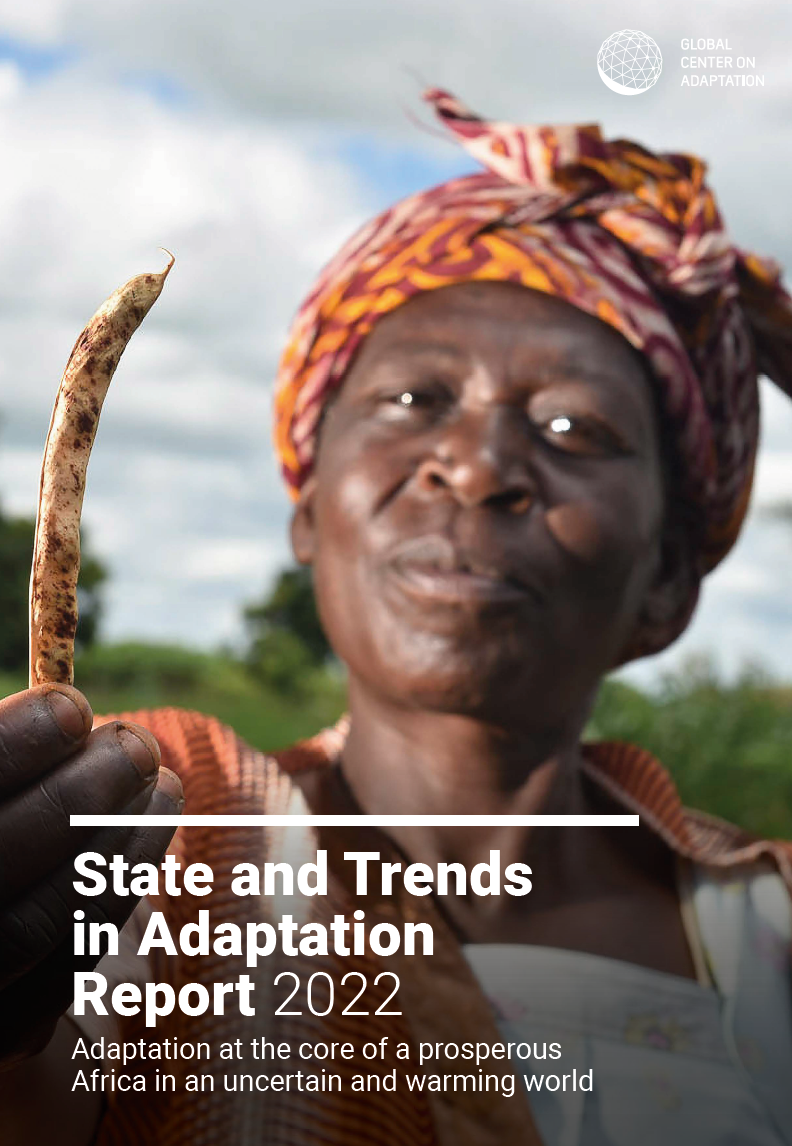
Direct Access Modality to access the Green Climate Fund
Africa is under-served by adaptation finance. Africa received USD 7.9 billion of an annual average of USD 46 billion in adaptation finance for 2019 and 2020. There is a large disparity between climate finance pledged, finance approved, and finance disbursed by the multilateral climate funds. As of January 2022, only 9.23% of global climate financing was earmarked for sub-Saharan Africa for adaptation purposes. Almost one third of the Green Climate Fund’s (GCF's) Direct Access Entities (DAEs) are in Africa, but only 11 out of 54 countries have at least one national accredited entity. DAEs are only accredited for projects with budgets below USD 50 million and are therefore limited in their ability to access funding for larger projects.
This project will develop a concept note as a starting point for a full funding proposal to the GCF. To achieve this, actions will include a desk review of national climate-related development strategies and reference documents in the target country; identification of a promising project idea, in close collaboration with relevant stakeholders; and facilitation of a consultative workshop to discuss the project’s rationale, main intervention areas and implementation arrangements.
Through the Technical Assistance Program (TAP), the Global Center on Adaptation (GCA) will accelerate the mobilization of adaptation finance. Through the direct access modality, GCA will enhance local capacity to formulate robust concept notes for funding consideration by the Green Climate Fund.
AAAP will support the climate risk assessment studies requested by the GCF.
- Four robust project/program concept notes and pipeline developed, for Burkina Faso, Democratic Republic of Congo, Niger and Nigeria.
- For the Democratic Republic of Congo, new sources of climate finance for adaptation and resilience investments identified.
- Development of a roadmap with key actions to prepare the full funding proposal, including the necessary complementary studies, the evaluation of the cost of these studies and the cost of the full funding proposal.
- Relevant initiatives or projects planned or underway and implemented in the project intervention areas
- Development of a portfolio of paradigm-shifting adaptation projects and programs, i.e., development of concept notes, supporting and enhancing funding proposals.
- Building capacities for adaptation finance planning, mobilization and implementation, i.e., Climate Public Expenditure Reviews.
- Direct Access strengthening with the aim to diversify and to increase the delivery channels, i.e., New Accreditation and Accreditation upgrades.
DRC: USD 58.75 million
Burkina Faso: USD 40 million
Niger: USD 50 million
Nigeria: USD 50 million
Total: USD 198.75 million
Africa Adaptation Acceleration Program showcases African youths driving climate innovation
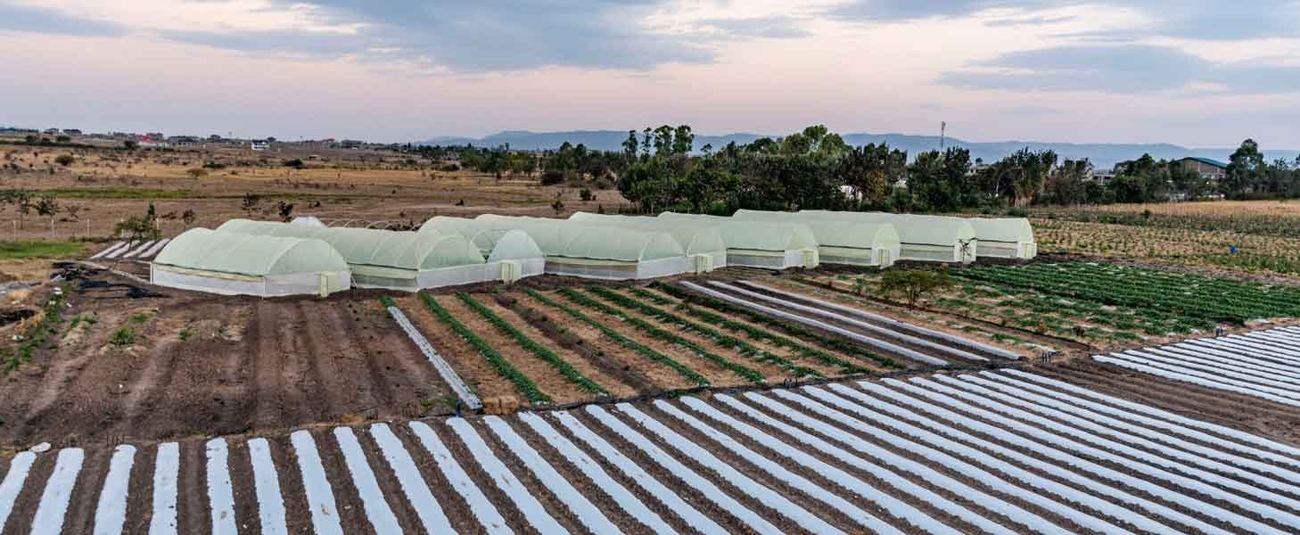
The Africa Adaptation Acceleration program (AAAP) – a joint initiative of the African Development Bank and the Global Center on Adaptation – recently showcased its initiative to harness the dynamism and leadership of Africa’s youth to drive climate adaption innovation.
On the side-lines of the recent 3rd Gobeshona Global Conference(link is external), AAAP brought together participants in its YouthADAPT program to share their experiences with the program as well as strategies to scale up youth-led approaches to adaptation
In his opening remarks, Dr. Kevin Kariuki, African Development Bank Vice President for Power, Energy, and Climate & Green Growth underscored young people’s integral role in Africa’s sustainable development.
“Youth form the backbone of Africa’s population, constituting over 60% of the population. The continent’s sustainable development hinges on harnessing this demographic dividend,” Kariuki said. “The AAAP, through its YouthADAPT pillar, has so far supported 35 youth-led enterprises in 14 African countries with $3.5 million to drive climate actions in sectors such as agriculture, waste management, renewable energy, water and sanitation,” Kariuki added. YouthADAPT is one of AAAPs four pillars for accelerating climate adaptation.
Caroline Mukuhi Mwangi, founder of Kimplanter Seedling(link is external) and Nurseries Limited, said her company was already seeing the benefits of participation in the program. Kimplanter provides drought resistant seedlings that boost food production and food security in Kenya.
Mwangi said, “We have ventured into new markets in semi-arid regions and expanded our seedling varieties, increasing our revenue by 36% as a result of AAAP support. Our customer base has also grown from 8,000 to 16,000 farmers and we have increased our staff from 17 to 32, all of whom are women or youth.”
Aramide Abe, the Program Lead of Jobs for Youth & Entrepreneurship at the Global Center on Adaptation(link is external) confirmed that participating enterprises have already begun to show results. She said some have seen revenues rise by up to 50 percent. A fifth have ventured into new markets and have raised over $106,000 in additional funding from different sources.
Juveline Ngum, the founder of Bleaglee Waste Management Limited, a Cameroon-based start-up company using drone technology to tackle waste disposal, also stressed the benefits of participating in YouthADAPT.
“We have expanded our waste disposal management solution from west Cameroon into Douala, effectively using drones to detect clogged drainages and utilizing data for demand driven waste management,” Ngum said. Now, we aim to expand across national borders into Dakar, Senegal.”
Noël N'guessan’s Cote d’Ivoire-based company, LONO(link is external) – a winner of the 2022 YouthADAPT challenge – has patented technology for the production of organic fertilizer. The company has also introduced modular and mobile bio digesters for the agri-food sector. Biodigesters use microbes and other bacteria to break down organic waste including fat, greases, and even animal manure.
Still, Nguessan said challenges remained. “The cost of prototyping hardware equipment can be prohibitively high, resulting in lengthy project development cycles, “he said. He pointed to financial management training as vital for youth-led businesses.
The session also featured presentations by African Development Bank partners and other global organizations that have rolled out similar initiatives to YouthAdapt.
Sandra Simbiri, Program Specialist at UNICEF’s Generation Unlimited(link is external), said:
“Supporting entrepreneurs through STEM principles is key to preparing the young for technological innovations.”
Alfred Asiko, Senior Market Engagement Manager for the ClimateTech Programme at GSMA(link is external), a mobile technology association, said it has played a role in empowering youth to deploy such technologies as the Internet of Things, artificial intelligence and blockchain to tackle climate challenges.
“Through our innovation fund, we offer grants to climate startups, with a focus on supporting resilient solutions that utilize frontier technologies. We also provide skills development and training to help entrepreneurs succeed in scaling their innovations,” Asiko said.
He said that venture capital (VCs) firms had a critical role to play. ”We need to see more VCs stepping up and taking over from development finance institutions (DFIs) in providing financing and support to youth-led businesses,” he added.
YouthADAPT targets reaching 10, 000 African youth-led enterprises by 2025, promoting innovation and inclusive growth for young people in climate resilient jobs and through youth enterprise development. The AAAP’s other three pillars are Climate-Smart Digital Technologies for Agriculture and Food Security; the African Infrastructure Resilience Accelerator and the Innovative Financial Initiatives for Africa
The third annual Gobeshona Global Conference, organized by the International Centre for Climate Change and Development, took place virtually from 10-16 March 2023. It focused on monitoring Locally- Led Adaptation (LLA) and resilience.
The Gambia: African Development Bank commits grants of $20.56 million to further upgrade Banjul port
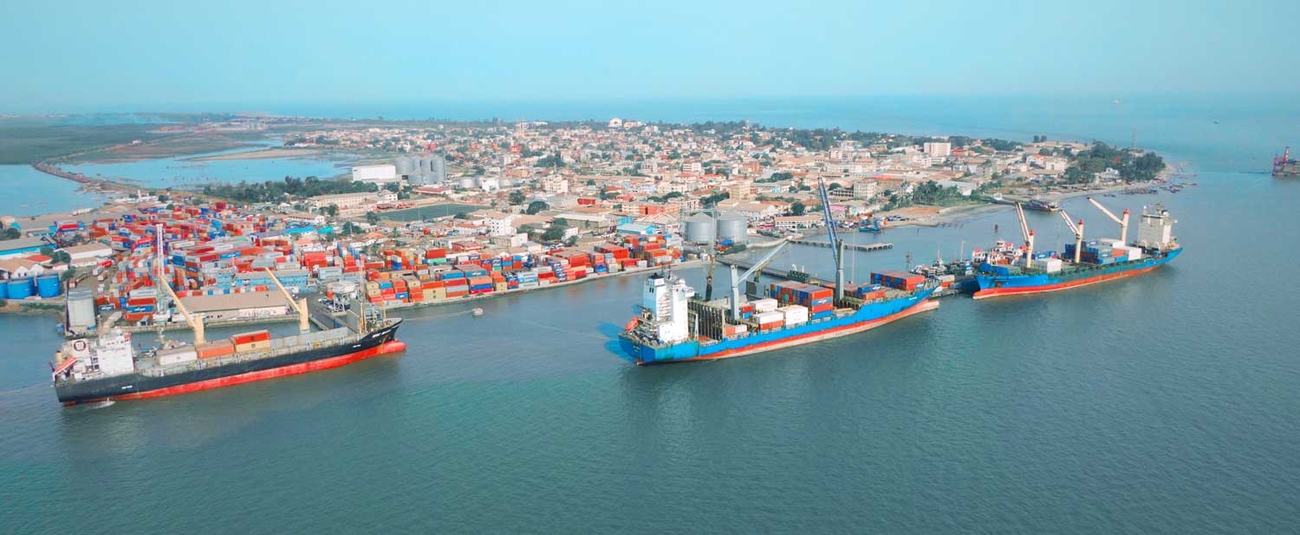
The Board of Directors of the African Development Fund (ADF), the concessional window of the African Development Bank Group, on Thursday approved grants worth $20.56 million to finance the fourth expansion of Banjul Port in The Gambia.
The funding comprises an ADF grant of $13.71 million and another $6.85 million grant from the Transition Support Facility window. The project will also receive a $450,000 grant from the Africa Adaptation Acceleration Programme (AAAP) a joint initiative of the African Development Bank and the Global Centre on Adaptation, for technical assistance to mainstream climate resilience into the expansion. AAAP will use cutting-edge climate analytics to identify and quantify the impacts of physical climate risk on the port infrastructure and provide adaptation investment options to climate-proof it.
The expansion will be financed in parallel with a private investor who will be selected competitively by the Gambian government. The World Bank and the African Development Bank supported the Banjul Port’s previous expansions.
The fourth expansion program entails an extension of the port jetty by 345 meters to accommodate up to three ships simultaneously instead of one currently. It also provides for the expansion of the container terminal area by 22,000 m2 to create space for unloading ships, replacement of a non-functioning ferry plying the Banjul and Bara crossing and widening port access roads by 3km to ease congestion. Information and communication processing systems will also be procured for efficient linkages between customs and the terminal operating system.
Upgrading the port will significantly reduce ship turnaround time and cut costly congestion and surcharges, enabling reductions in sea freight costs and demurrage payments. The works will boost the facility’s capacity to meet growing traffic and improve efficiency in operations and management as it digitizes its procedures. The introduction of green and low-carbon emission ferries will make the port infrastructure more climate-friendly and climate-resilient. The project is also expected to empower women's groups through gender-sensitive procurement and provide jobs, especially for the youth.
At the end of November 2022, the Bank Group had 12 active operations in The Gambia, valued at $166.6 million. Eighty percent (80%) of these are financed through its ADF window. The transport sector represents 55.6% of the portfolio, the largest share, followed by agriculture and rural development with 24%. Energy sector projects constitute 12% of the portfolio.
Contact:
Kwasi Kpodo, Communication and External Relations Department, African Development Bank, email: media@afdb.org(link sends e-mail)
African Development Bank and Global Center on Adaptation work with partners to enhance capacity to access climate adaptation funding
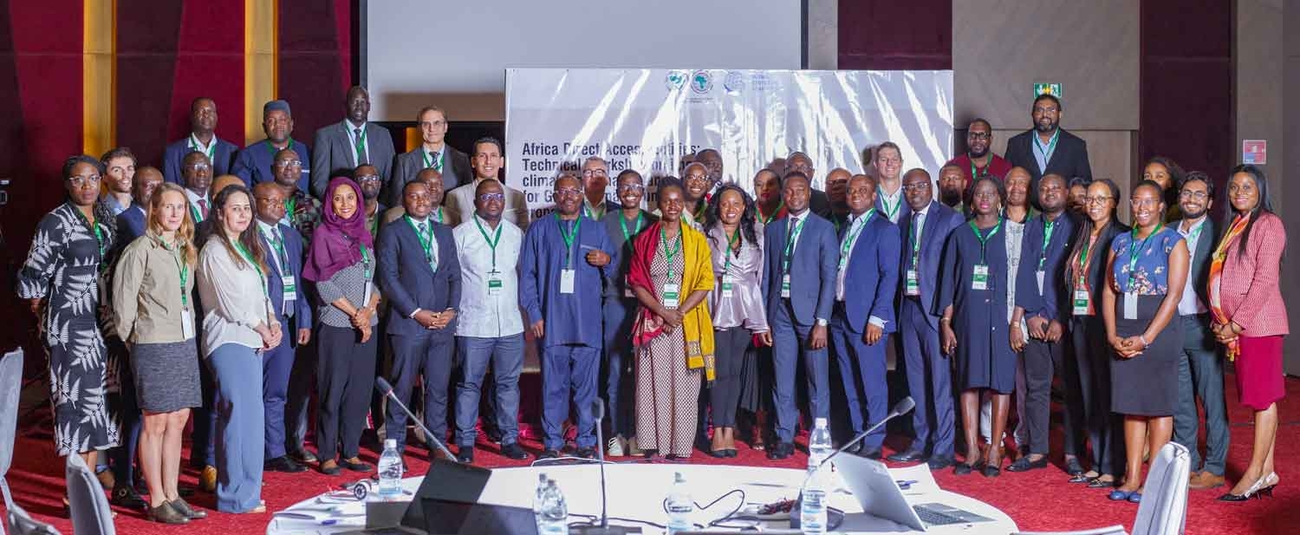
The African Development Bank and Global Center on Adaptation today launched a new initiative under the Technical Assistant Programme of the Africa Adaptation Acceleration Program(link is external) to help African countries access more climate adaptation funding.
A climate rationale is the scientific basis of a project and describes the climate change scenario, outlining the climate problem in a particular country (e.g., flooding, droughts for an adaptation project) and region that the project will be implemented in. The rigorous requirement by Green Climate Fund for climate rationale based on 30 years of point-source climate data has led to a high attrition rate for funding proposals with an adaptation focus.
Through this new initiative, Direct Access Entities in Africa will receive additional support to enhance their capacity with regards to climate data, tools, and methodologies that help them meet the critical requirements of climate rationale for compelling funding proposals that could merit approval by the GCF Board.
The GCF is one of the mechanisms of the United Nations Framework Convention on Climate Change to significantly contribute to the global efforts towards attaining the goals set by the international community to combat climate change. It supports developing countries to limit or reduce their greenhouse gas emissions and adapt to climate change impacts. For adaptation, it allocates resources based on: (i) the ability of a proposed activity to demonstrate its potential to adapt to the impacts of climate change by promoting sustainable development and a paradigm shift; (ii) the urgent and immediate needs of vulnerable countries, in particular, Least Developed Countries, Small Island Developing States and African States.
The African Development Bank and the Global Center on Adaptation will work with their partners to select at least four proposals each year based on the pipeline of Direct Access Entities funding proposals that require additional technical assistance and guidance. Through its Technical Assistance Programme (TAP), the Global Center on Adaptation will provide technical assistance for a selected set of funding proposals.
The launch event for the new initiative took place in Abidjan, Cote d’Ivoire, on the 6th and 7th of December with program partners including the Green Climate Fund (GCF), World Meteorological Organization (WMO), Africa Climate Change Fund, ClimDev Special Fund and Regional Climate Centers in Africa.
23 Direct Access Entities accredited or at the final stage of accreditation to GCF participated in the two-day event with representatives of regional and international accredited entities, including the Development Bank of Southern Africa, the International Fund for Agricultural Development, the West African Development Bank, the Africa Finance Corporation and the United Nations Environment Program.
In opening remarks,Professor Anthony O. Nyong, Senior Director for Africa at the Global Center on Adaptation said , “Africa is on the frontline of our climate emergency. Through this new initiative, we aim to significantly increase the flow of adaptation finance to the region. Given the central role of the Green Climate Fund, the unprecedented volumes of funding it offers, the range of financial instruments it provides, and its different access modalities, we will initially focus this initiative on accessing GCF resources, but this is just the start of our long-term partnership with African countries to mobilize finance for climate adaptation across the continent. »
Dr. Al Hamndou Dorsouma, Acting Director of the Department of Climate Change and Green Growth at the African Development Bank, said, “climate rationale for GCF funding proposal is like the foundation of a building. A solid building should have a solid foundation and I am glad our bank has forged the collaboration with relevant regional and international institutions to help direct access entities secure approvals for more funding proposals on adaptation with strong climate rationale.”
Dr. Kevin Horsburgh, Lead Climate Scientist representing GCF, noted, “To promote transformational projects and catalyze climate finance at scale, GCF follows a four-pronged approach: transformational planning; catalyzing innovation; de-risking high impact projects; and aligning finance with sustainable development. Each step needs the best available information to assist decision-making. The GCF is pleased to be working with the WMO to create the bridge between climate information and all those who need to use it, to improve access to climate finance.”
Amir Delju, Senior Scientific Officer with the World Meteorological Organization, said, “Effective and progressive response to the urgent threat of climate change should be based on ‘the best available scientific knowledge.’ We recognize that it is very challenging for least developed countries to meet this requirement. As an expert service provider, WMO will continue providing the full value cycle of climate services, from data to analysis, information production, interpretation of the findings, and expert advice.”
Contact:
- Romaric OLLO HIEN, Communication and External Relations Department, African Development Bank, email: media@afdb.org(link sends e-mail)
- Technical Contact: Timothy Afful-Koomson, GCF Coordinator, African Development Bank, email: t.afful-koomson@afdb.org(link sends e-mail)
- Technical Contact: Ali Haider, Senior Program Officer, Climate Finance, Global Center on Adaptation, email: ali.haider@gca.org(link sends e-mail)
Africa Climate Change Fund launches Women and Youth Entrepreneurship Project

The Africa Climate Change Fund (ACCF) Secretariat has launched a scheme to support mechanisms for climate adaptation finance for women entrepreneurs and youth.
The scheme, “YouthADAPT: Empowering Women and Youth for Entrepreneurship and Job Creation in Climate Adaptation and Resilience,” will develop innovative, transformative climate-resilient bankable projects aligned with African countries’ Nationally Determined Contributions.
YouthADAPT is a flagship program under the Africa Adaptation Acceleration Program (AAAP), which is unlocking the untapped potential of youth in Africa to drive resilience and green enterprise.
The virtual launch followed the approval of a $1 million grant funding by the ACCF’s development partners for the project. The event rallied together stakeholders, including the project team, quality control, adaptation, gender, and communication experts, and climate change and green growth experts to share experiences.
ACCF Coordinator Rita Effah, and the Portfolio Officer, Lucy Debrion, explained the Fund’s operational guidelines on Bank-implemented projects.
AAAP Coordinator and Principal Climate Change Officer Edith Ofwona Adera said, "African youth are leading the way, not in talk, but in concrete climate action; as agents of change, innovators, and entrepreneurs.”
She said the scheme would support women-led local enterprises promoting adaptation solutions to create additional jobs.
Adera thanked the ACCF for collaborating on the projects. Adera also commended the Fund for its role in facilitating the production of proposals. “That makes our work easier,” she added.
Following the launch, the AAAP secretariat will regularly engage with the ACCF Secretariat on significant project milestones to ensure that the objective is fully accomplished.
Since 2017, the ACCF Governing Committees have approved 26 projects estimated at $15.87 million.
The AAAP will implement the project. For more information on ACCF and AAAP, please visit http://accf.afdb.org and www.afdb.org/aaap

